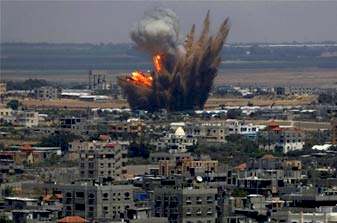Jerusalem, Jul 9: Israeli warplanes pounded targets in the Gaza Strip Wednesday as a major campaign to stop volleys of Palestinian rocket fire entered its second day, leaving 28 people dead and more than 100 wounded.
 A strike on a home in Beit Hanoun, in northern Gaza, claimed the lives of a commander of the Al-Quds Brigades, the armed wing of Islamic Jihad, his parents, a woman and two children, emergency services spokesman Ashraf al-Qudra said.
A strike on a home in Beit Hanoun, in northern Gaza, claimed the lives of a commander of the Al-Quds Brigades, the armed wing of Islamic Jihad, his parents, a woman and two children, emergency services spokesman Ashraf al-Qudra said.
Another strike early this morning on the southern city of Rafah killed a young man.
The deaths brought to 28 the number of fatalities since the launch of Israel's Operation Protective Edge early yesterday, with the Jewish state not ruling out a ground operation to stop the rocket attacks.
Israeli air strikes took the lives of 24 people while four Hamas militants were killed staging a beachfront assault on an army base just north of the besieged Strip.
During the day Israel staged multiple air strikes on the Gaza Strip, which also left more than 100 wounded, and militants from the Islamist movement Hamas hit back with rocket fire on Israel's major population centres in Jerusalem and Tel Aviv in the most serious flare-up over Gaza since November 2012.
As sirens wailed across the Holy City, three loud explosions were heard and a series of flashes lit the sky to the southwest.
Police said one rocket fell in the vicinity of Ramat Raziel, some 10 kilometres from the city's southwestern flank and two more fell in outlying areas, without elaborating.
Police spokeswoman Luba Samri said there were no reports of injuries anywhere in the Jerusalem area.
The Ezzedine al-Qassam Brigades, the armed wing of Hamas, said it had fired four M75 rockets at Jerusalem, which lies 65 kilometres from the Palestinian enclave.
It also claimed to have launched a rocket at Haifa, 165 kilometres away.
There was no report of anything hitting the northern port city but the army said a rocket did fall on Hadera, 100 kilometres north of Gaza.
Hamas militants also said yesterday they fired four rockets at Tel Aviv, 60 kilometres north of Gaza, setting sirens off across the city.




Comments
Add new comment